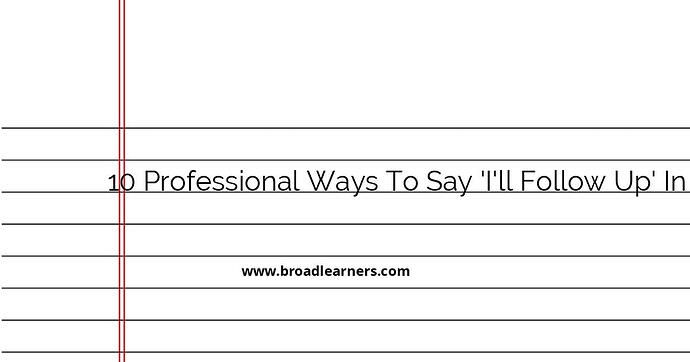When you want to follow up on something in an email, it's important to use professional language that conveys your intention clearly. Saying 'I'll follow up' is a common phrase, but there are many alternative ways to express the same idea professionally. Here are 10 professional ways to say 'I'll follow up' in emails:
- I will be in touch
- I will get back to you
- I'll provide an update soon
- I'll keep you informed
- I'll check in with you
- I'll circle back on this
- I'll make sure to follow up
- I'll touch base with you
- I'll reach out again
- I'll continue the conversation
Let's explore each alternative in more detail with examples:
1. I will be in touch
This phrase indicates that you will initiate contact with the recipient in the future. It shows your commitment to follow up and stay connected.
Example:
Thank you for the meeting. I found our discussion insightful. I will be in touch next week to discuss the next steps.
2. I will get back to you
This phrase implies that you will provide a response or update to the recipient at a later time. It shows that you value their input and will take the necessary actions.
Example:
Thank you for sharing your feedback. I will review it and get back to you with a revised proposal by the end of the day.
3. I'll provide an update soon
This phrase assures the recipient that you will keep them informed about any developments or changes. It conveys your intention to share relevant information in a timely manner.
Example:
Thank you for your interest in our product. We are currently working on some updates and will provide you with an update soon.
4. I'll keep you informed
This phrase communicates that you will regularly update the recipient on the progress or status of a project or task. It demonstrates your commitment to transparency and open communication.
Example:
Thank you for your support. We will keep you informed about the latest developments and milestones of the project.
5. I'll check in with you
This phrase suggests that you will proactively reach out to the recipient to discuss or review a specific matter. It shows your initiative to stay engaged and address any concerns.
Example:
Thank you for your input. I'll check in with you next week to discuss the implementation plan in more detail.
6. I'll circle back on this
This phrase indicates that you will revisit the topic or issue at a later time. It conveys your intention to follow up and provide additional information or clarification.
Example:
Thank you for raising this question. I'll circle back on this after consulting with our team and provide you with a comprehensive answer.
7. I'll make sure to follow up
This phrase emphasizes your commitment to take action and ensure that the matter is addressed. It shows your dedication to follow through and provide the necessary support.
Example:
Thank you for bringing this to my attention. I'll make sure to follow up with the relevant department and keep you updated on the progress.
8. I'll touch base with you
This phrase implies that you will reach out to the recipient to discuss or review a specific matter. It conveys your intention to have a meaningful conversation and exchange information.
Example:
Thank you for your time during the meeting. I'll touch base with you next week to discuss the action items and next steps.
9. I'll reach out again
This phrase suggests that you will initiate contact with the recipient again in the future. It shows your persistence and determination to maintain communication.
Example:
Thank you for your consideration. If I don't hear back from you by the end of the week, I'll reach out again to discuss the proposal further.
10. I'll continue the conversation
This phrase indicates that you will keep the dialogue or discussion going with the recipient. It conveys your interest in further collaboration and exchange of ideas.
Example:
Thank you for your input. I appreciate your perspective and would like to continue the conversation to explore potential solutions.
Using these alternative phrases will help you sound more professional and maintain effective communication in your emails. Choose the phrase that best suits your specific context and relationship with the recipient.
Remember to always follow up on your commitments and provide the necessary updates in a timely manner.
Did I miss anything? Respond below
